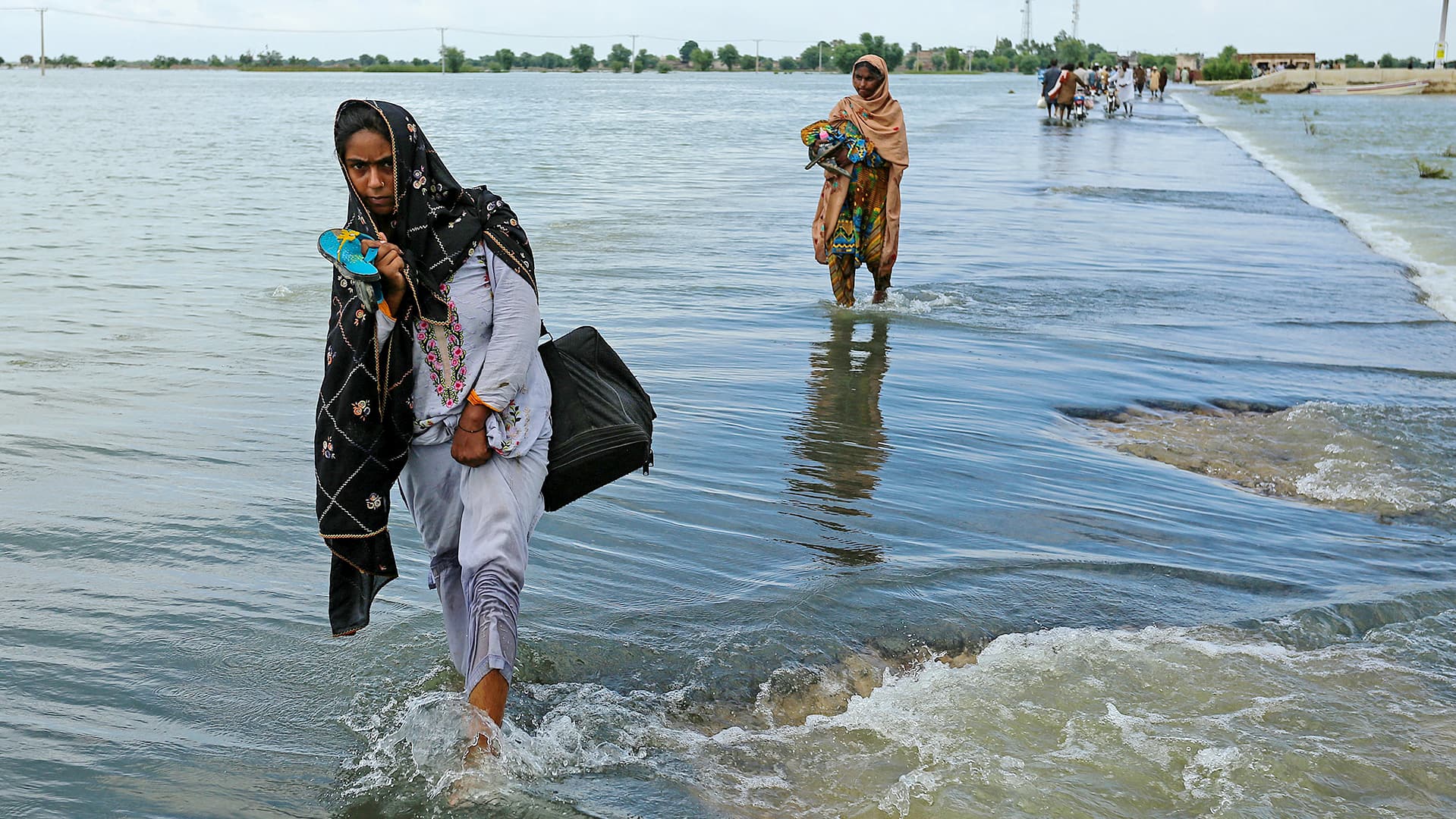With climate disasters piling up around the world, developing countries want wealthy nations to pay for losses

As envoys from around the world gather in Sharm el-Sheikh, Egypt, for the UN's 27th annual climate change conference, a demand from vulnerable countries that's been around since the first conference will finally have a shot at centre stage.
Countries in the Global South will be asking for compensation for the losses and damages that they are already suffering as the climate crisis escalates — and will continue to suffer in an increasingly uncertain future.
At the heart of the demand is the fact that the countries most vulnerable to climate change are the least responsible for the greenhouse gas emissions that have caused the problem.

Will rich nations pay for global climate disasters?
Vulnerable countries are bearing the brunt of climate change, even though they aren’t the ones driving it. At COP27, leaders from the Global South will tell rich nations — the world’s highest greenhouse gas emitters — that it's time to pay for damages.
"This is a clear injustice, because it is obviously unfair that particularly vulnerable countries like ours have to have to figure out our own solutions, if basically limited to no support," said Michai Robertson, lead negotiator on climate finance for the Alliance of Small Island States (AOSIS).
That alliance, which began in 1990 to represent the interests of 39 vulnerable and low-lying countries, is pushing to have loss and damage on the agenda this year. They want negotiations over compensation to begin now and a funding mechanism to be finalized over the next year.
Climate injustice on the agenda
Robertson is from Antigua and Barbuda, one of the island countries most at risk of suffering massive losses from climate change. In 2017, Hurricane Irma forced the evacuation of all of Barbuda's 1,600 residents, and destroyed most of the buildings on the island.
Climate change will make such disasters more frequent. Island countries face devastation from storms and floods, and an existential threat from rising sea levels that may swallow up entire communities.
At the same time, the greenhouse gas emissions of island countries are minuscule compared to the resource-based, highly industrialized economies of wealthy nations, and their budgets cannot afford all the recovery and rebuilding that future disasters will need.
"In developed countries, you have your treasuries to lean on," Robertson said. "We don't have that safety net…. We need support to build that safety net and cushion when all of these things happen, to address these things once they happen."
AOSIS is asking for a "fit-for-purpose multilateral fund" to be set up under the UN's climate change convention, with the money going to not just vulnerable countries but also directly to communities most impacted by climate change. A dollar figure hasn't been proposed.
How might climate reparations work?
In an interview on her way to COP27, Canada's ambassador for climate change said that Canada supports adding loss and damage to the conference's agenda.
"A lot more needs to be done on averting, minimizing and addressing loss and damage in developing countries, and more funding will be required," said Catherine Stewart.
Stewart said the details of loss and damage funding will need to be negotiated, and could come from many different sources of money and support.
Outside of the UN Conference of the Parties (COP) process, Germany has proposed a program called Global Shield that would be run by the G7 group of industrialized nations to address some of these losses. Global Shield will help vulnerable countries and communities get insurance to help rebuild and recover after climate disasters.

But Ahmed El Droubi, regional campaigns manager for Greenpeace in the Middle East and North Africa says the proposals don't match the scale of support that will be needed.
"There are concerns that such a system is going to profit insurance company executives more than communities in the Global South," he said.
El Droubi says that having COP27 in Egypt — an "African COP" — is "a chance for countries in the Global South to stand united and demand climate justice."
What's been pledged so far?
Canada has played a prominent role in global climate financing to help developing countries mitigate climate change by cutting their emissions and adapting to more extreme weather. In 2009, wealthy countries pledged to reach a climate financing goal of $100 billion US by 2020.
That goal has not been met.
According to latest estimates, wealthy countries came up with about $83 billion U.S. in 2020. But Canada and Germany have led a diplomatic effort to wrangle wealthy countries and reach the $100 billion, which they estimate will happen by 2023.
However, that money is not specifically for losses and damages, which include economic and non-economic losses that cannot be avoided through adaptation.
"We need a system. The UN does not have a system at the moment that helps countries around the world apply, get funding immediately after climate disasters," said Eddy Pérez, international climate diplomacy manager at advocacy group Climate Action Network Canada.

Recent disasters emphasize losses
The need for such a system was brought into focus during the devastating floods in Pakistan caused by unusually heavy monsoon rains. A study by the World Weather Attribution initiative found that the increased rainfall was likely caused by climate change.
The floods disrupted the lives of 33 million people and submerged a third of the whole country. The economic losses are estimated at over $33 billion US. The entire annual budget of Pakistan's government is $43 billion U.S.
According to the latest report on the impacts of climate change from the Intergovernmental Panel on Climate Change, even limiting global warming to 1.5 C in the near-term, which is a goal of the international Paris Agreement, will not eliminate all the projected losses and damages to humans and ecosystems.

"It's just a serious reminder that you can have today, but you cannot have tomorrow, for us," said Ineza Grace, a loss and damage activist and researcher, and a member of Rwanda's delegation to COP27.
"And it's really, really terrifying."
Grace said that while negotiating on loss and damage, wealthy countries need to let the Global South take the lead and let them propose the solutions.
"What we were demanding is for, really from the Global North, to unlearn everything they think that we need — and listen to what we know we need," she said.

Add some “good” to your morning and evening.
A variety of newsletters you'll love, delivered straight to you.
*****
Credit belongs to : www.cbc.ca
 MaharlikaNews | Canada Leading Online Filipino Newspaper Portal The No. 1 most engaged information website for Filipino – Canadian in Canada. MaharlikaNews.com received almost a quarter a million visitors in 2020.
MaharlikaNews | Canada Leading Online Filipino Newspaper Portal The No. 1 most engaged information website for Filipino – Canadian in Canada. MaharlikaNews.com received almost a quarter a million visitors in 2020.







